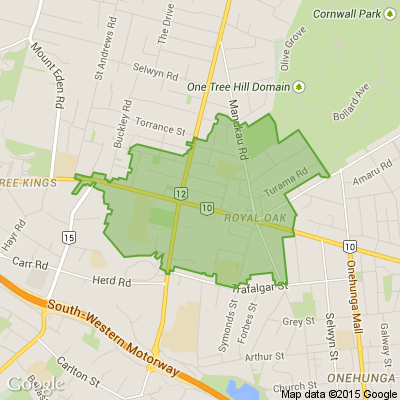THE ORNAMENTAL BRICK COTTAGE (corner Trafalgar & Manukau)
Corner called Robin's Corner after grocers shop there.
Passengers on all types of conveyances, Horse drawn bus from the late 1870's, then Electric trams from 1903 to 1956, and Diesel and Trolley buses from 1956, down to the present day, evinced an absorbing interest in the brick cottage which stood in Trafalgar Street, adjacent to Manukau Road, Onehunga.
The neat appearance, clean and wholesome, looking as though it was hosed down every day of its existence, was the subject of much speculation of latter day viewers. There were to be found in the ranks of the historians of Onehunga, some who said that the pretty little cottage had been built by a New Zealand Royal Fencible in the 1847-56 period. Others, however, considered it was erected by a discharged Fencible in the 1860s. Some said it was erected by the Government for the senior-sergeant of Fencibles stationed in Onehunga.
All conjectures of the would-be-pundits led to a private investigator delving into the old records to answer an inquiry directly submitted to the Onehunga Borough Council by an Arts Diploma holder of the Elam School of Arts. The Town Clerk, the late Mr. Norman L. Norman ascertained from a reliable source that the brick cottage stood on a part allotment of land which belonged to John Beattie, a Fencible, ex¬ Royal Marines, who came to New Zealand with the Fifth Division of pensioners on the troopship "Berhampore" arriving at Auckland on June, 16th, 1849. The original grant of a contracted area of land, something greater than one acre, situated at the corner of Manukau Road and Trafalgar Street, was issued to John Beattie in 1856. The corner, thereafter, was known as Beattie's Corner, and retained this appellation until Mr. J. Robins built his store in the late 1880's on a site opposite to John Beattie's acre, when the name was Robin's corner, supplanting Beattie's Corner.
The purchaser of the section on which the cottage stood was Thomas Henry Massey, believed to be a Midlander from England. Massey was noted for his flair for artistic construction in brick and it is said that he was responsible for the design of the facades of the Branches erected by the Auckland Savings Bank in Newmarket and Onehunga in 1885.
The house in Trafalgar street, with a chimney at either end, its slate roof and white stone ornamental facings, was an object of interest to local residents and horse drawn bus passengers as well, while it was being erected.
The bricks were made at Avondale to Massey's specifications, and any that did not measure up to the standard required by the builder were rejected.
The actual year in which the cottage was built is not recorded in archives of the Borough Council. But two residents who were asked about 30 years ago, (1934) to fix a year which would be approximately correct, said that the cottage was occupied by Thomas Massey in 1878.
The edifice being finished off at the present moment is a bit different from what was originally there as described above.
Te Pūrākau o Te Rangatira Ngākau Hūmarie - Day 34
The Tale of the Humble Leader
In a small Māori village near the coast of Aotearoa, the whānau were preparing for Te Rā o te Kirihimete (Christmas Day). It was a time of celebration, sharing, and remembering the values of aroha (love), manaakitanga (hospitality), and kotahitanga (unity). However, this year, the village faced a challenge. Their rangatira, Wiremu, had grown distant and prideful, burdened by his position.
Wiremu often made decisions alone, thinking that his wisdom and authority were enough to guide the iwi. While the villagers respected him, they felt unheard, and the spirit of unity began to fade.
As the Kirihimete celebrations approached, the kaumātua, Hinewai, decided to intervene. She invited Wiremu to the marae one evening, where she shared a story about Tāwhaki, the demigod who ascended to the heavens not through power, but through humility and service.
“Wiremu,” Hinewai said, “even the greatest leaders are at their strongest when they serve their people. Leadership is not about standing above others but walking beside them.”
Wiremu reflected on her words but was unsure how to change.
The Lesson of the Whetū (Stars)
On Christmas Eve, as the village prepared for their festivities, a fierce storm rolled in from the sea. The winds howled, and the rain poured, threatening to ruin the celebration. The central whare kai (dining hall) began to leak, and the decorations the tamariki had made were soaked. The people gathered anxiously, unsure of how to proceed.
Wiremu stood at the edge of the marae, looking at the chaos. In that moment, Hinewai’s words echoed in his mind: “Even the greatest leaders serve their people.”
Without hesitation, Wiremu took off his korowai (cloak of leadership) and joined the villagers. He grabbed buckets to catch the rain, helped rebuild the decorations, and reassured the tamariki that their work would be restored. His humility inspired others, and soon the entire iwi was working together, laughing and singing as they prepared the whare for the celebration.
A Kirihimete Under the Stars
When the storm cleared, the sky was filled with bright whetū (stars). The villagers gathered around a glowing fire outside the whare, sharing kai and stories of gratitude. Wiremu stood among them, no longer as a distant rangatira, but as a friend and servant of his people.
Under the starlit sky, Hinewai stood and addressed the iwi.
“This Kirihimete, we are reminded that true leadership is like the brightest whetū. It does not shine to outdo others but guides them through darkness. Wiremu has shown us the power of humility, and through his service, we have rediscovered our unity.”
Wiremu bowed his head humbly. “Tonight, you have all taught me that a leader is nothing without their people. Let us carry this spirit of kotahitanga and aroha into the new year.”
The villagers cheered, and the spirit of Te Rā o te Kirihimete shone brightly in their hearts.
Moral of the Story:
Leadership is not about authority or pride but about humility and service. Like the whetū that guide travelers, a true leader walks alongside their people, bringing light and unity through service and aroha. At Christmas, we are reminded of the importance of giving, humility, and leading with love.
⚠️ DOGS DIE IN HOT CARS. If you love them, don't leave them. ⚠️
It's a message we share time and time again, and this year, we're calling on you to help us spread that message further.
Did you know that calls to SPCA about dogs left inside hot cars made up a whopping 11% of all welfare calls last summer? This is a completely preventable issue, and one which is causing hundreds of dogs (often loved pets) to suffer.
Here are some quick facts to share with the dog owners in your life:
👉 The temperature inside a car can heat to over 50°C in less than 15 minutes.
👉 Parking in the shade and cracking windows does little to help on a warm day. Dogs rely on panting to keep cool, which they can't do in a hot car.
👉 This puts dogs at a high risk of heatstroke - a serious condition for dogs, with a mortality rate between 39%-50%.
👉 It is an offence under the Animal Welfare Act to leave a dog in a hot vehicle if they are showing signs of heat stress. You can be fined, and prosecuted.
SPCA has created downloadable resources to help you spread the message even further. Posters, a flyer, and a social media tile can be downloaded from our website here: www.spca.nz...
We encourage you to use these - and ask your local businesses to display the posters if they can. Flyers can be kept in your car and handed out as needed.
This is a community problem, and one we cannot solve alone. Help us to prevent more tragedies this summer by sharing this post.
On behalf of the animals - thank you ❤️









 Loading…
Loading…




